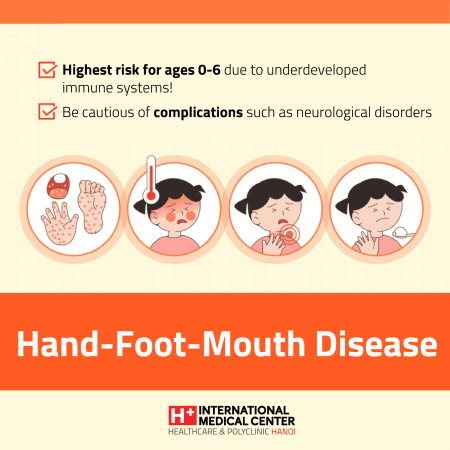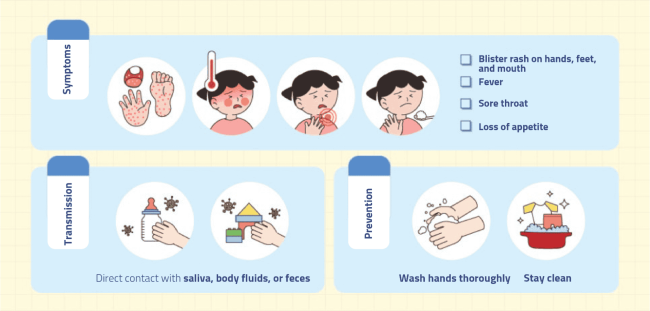In recent weeks, there has been a sharp increase in cases of hand, foot and mouth disease (HFMD), particularly among infants and young children. This has prompted urgent public health responses in many areas. Caused by a contagious virus, HFMD spreads easily and most commonly affects children under the age of five. Early recognition and prevention are essential for protecting your child’s health.
What Should Parents Know About HFMD?
HFMD is a viral infection caused by the Coxsackievirus or Enterovirus 71 (EV71). It tends to spread rapidly in summer, particularly in nursery and daycare environments where young children gather.
The disease causes blister-like rashes on the hands, feet, and mouth, and spreads through contact with saliva, nasal mucus, stool, or bodily fluids. Symptoms include fever, sore throat, loss of appetite, and sometimes diarrhea.
Most cases resolve within 7 to 10 days without major complications. However, cases caused by EV71 can be more severe and potentially life-threatening.
More serious symptoms may include:
-
Prolonged fever (over 38°C)
-
Vomiting, diarrhea, or loss of appetite
-
Neurological complications such as encephalitis, meningitis, or pulmonary edema
-
Risk of shock or death in rare cases
If your child develops a fever with a vesicular rash on the hands, feet, or inside the mouth, seek medical attention immediately.
The Numbers You Should Know
According to the World Health Organization (WHO), Vietnam records 50,000 to 100,000 HFMD cases annually, with some resulting in fatalities.
In 2023 alone, over 80,700 cases were reported with 21 deaths, marking a 68.6% increase in infections and a sharp rise in EV71-positive cases.
In just two years, the infection rate among children has risen 20-fold, a deeply concerning statistic.
By week 20 of 2024 (May 13–19), the weekly suspected case rate jumped from 2.7 to 8.9 per week — more than tripling in just five weeks.
How to Prevent and Manage HFMD in Children
Currently, there is no specific vaccine or treatment for HFMD. Therefore, prevention and early care are essential:
-
Hand hygiene: Wash hands frequently with soap, especially after changing diapers, using the toilet, or handling toys and shared items
-
Separate personal items: Do not share towels, utensils, or clothing with infected children
-
Disinfect surfaces: Clean and sanitize toys, doorknobs, tables, and other high-contact areas regularly
-
Wear masks: Encourage children and caregivers to wear masks, especially in group settings or during outbreaks
Hydration and nutrition are also crucial. If mouth sores make eating difficult, offer soft, bland foods that are easy to swallow. In serious cases, oral rehydration or IV fluids may be necessary to prevent dehydration.
Seek Medical Care If Your Child Has:
-
Persistent high fever
-
Difficulty breathing or swallowing
-
Signs of dehydration (dry lips, sunken eyes, decreased urination)
-
A suspected HFMD rash, especially during peak outbreak season
HFMD Care at H PLUS International Medical Center
At H PLUS, we offer professional care for HFMD with:
-
Experienced pediatricians who provide thorough consultation and compassionate support
-
Advanced diagnostic equipment imported from leading international manufacturers
-
Attentive service that ensures your child’s comfort and your peace of mind
Let us help your child recover safely and comfortably. Contact us today for consultation and care.
—
Phòng khám Đa khoa Quốc tế H PLUS | H PLUS International Medical Center
“Y học tiên phong – Song hành cùng y đức” | “Excellence in Medicine – Compassion for humanity”
📍 Tầng 7–8, Tòa nhà Văn phòng A, Lotte Mall Tây Hồ, 272 Võ Chí Công, Hà Nội
🌐 Zalo OA: https://zalo.me/hplushn
🌐 Kakao Talk: https://pf.kakao.com/_AcWun
📝 Đặt lịch nhanh: https://forms.gle/8t84zLGVjw4gJQei9
 +84 24-7306-9889
+84 24-7306-9889  Booking
Booking 




